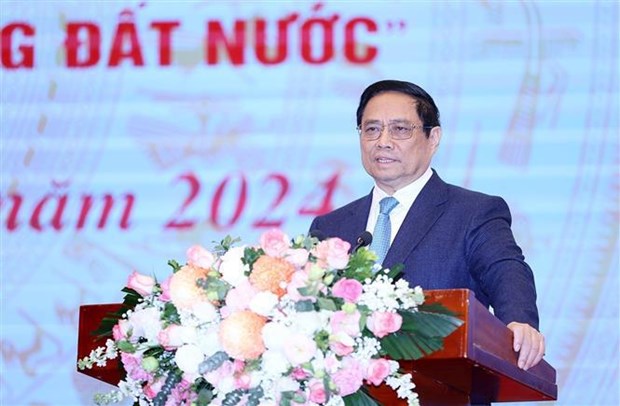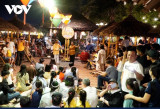PM demands stronger national, int’l connectivity in culture, sports, tourism
Prime Minister Pham Minh Chinh on January 3 demanded enhancing inter-regional, national, and international connectivity in culture, sports, and tourism.
 PM Pham Minh Chinh addresses the conference of the Ministry of Culture, Sports and Tourism on January 3
PM Pham Minh Chinh addresses the conference of the Ministry of Culture, Sports and Tourism on January 3
He made the request at a hybrid conference held by the Ministry of Culture, Sports and Tourism (MCST) to review the performance last year and launch tasks for 2024.
Highlighting the growing role and position of the culture, sports, and tourism sector in recent years, he said the Party and State attach great importance to culture, which is an internal strength of a nation. While sports help improve physical and mental health as well as will of each people, tourism is a key sector in national economic development.
PM Chinh applauded efforts and achievements by those working in the fields of culture, sports and tourism, but also pointed out certain problems, shortcomings, difficulties, and challenges they need to surmount.
He asked the sector, including the MCST, to make breakthroughs in institutionalising the Party and State’s viewpoints, guidelines, policies, and laws on cultural, sports, and tourism development; pay more attention to reforming administrative procedures, improving the investment and business climate, and stepping up digital transformation; press on with preserving, upgrading, and bringing into play national heritage and cultural values, along with tangible and intangible cultural values of regions; harmonise the relationship between preservation and development; and diversify forms of communications and education about heritage.
The sector needs to coordinate with other sectors and localities to build, upgrade, and promote the effectiveness of cultural facilities; properly organise cultural activities in celebration of major anniversaries and events of the country; and strongly bring into play the role of families in nurturing people’s morality and dignity, he continued.
The Government leader told the sector to improve the effectiveness of and reform state agencies’ management over sports, facilitate private parties’ engagement in sports development, devise mechanisms and policies for promoting sports economy, and reform the mass sports movement.
In addition, the PM ordered strongly reforming tourism promotion methodology, developing a smart tourism ecosystem in tandem with conducting digital transformation, enriching experiences for tourists, and stepping up green technology application so as to reach the targets of 18 million international tourist arrivals, 110 million domestic visitors, and 850 trillion VND (34.8 billion USD) in tourism revenue this year.
He asked the sector to strengthen connectivity within each region, among different regions, and with other countries in cultural, sports, and tourism affairs.
It is also necessary to ensure equal access to culture, sports, and tourism, particularly for residents in rural, remote, border, and marine areas and for vulnerable groups, PM Chinh emphasised.
Looking back on the sector’s performance last year, participants said major national and inter-regional cultural, sports, and tourism events were held and received warm response from people and tourists.
In particular, thanks to creative methods adopted and policies issued to tackle bottlenecks, tourism recovered quickly with about 12.5 million international visitors attracted to Vietnam – exceeding the initial target of 8 million and rising 3.5-fold from 2022, and 108 million domestic visitors – 5.8% higher than the target.
Cultural industries were fostered while sports activities received more investment. At the 32nd Southeast Asian Games (SEA Games), the Vietnamese delegation for the first time topped the medal standings of a SEA Games held in another country, the conference heard./.
VNA
 Binh Duong ready for Dong Nam Bo Judo Open Tournament 2024
Binh Duong ready for Dong Nam Bo Judo Open Tournament 2024
 Vietnam promotes cultural heritage values for sustainable future
Vietnam promotes cultural heritage values for sustainable future
Vietnamese culture promoted in Laos
 More than 10,000 runners to join Binh Phuoc Marathon
More than 10,000 runners to join Binh Phuoc Marathon
 More playgrounds created for the public
More playgrounds created for the public
 Vietnam's head coach announces squad for regional football tournament
Vietnam's head coach announces squad for regional football tournament
 PM Pham Minh Chinh joins Vietnam Day in Brazil
PM Pham Minh Chinh joins Vietnam Day in Brazil
 Tuyen Quang Province preserves, promotes “Then” cultural songs
Tuyen Quang Province preserves, promotes “Then” cultural songs
 Vietnam’s animation promotes national cultural values
Vietnam’s animation promotes national cultural values
Vietnam wins bronze medal at World Judo Championships



